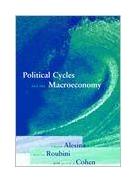|
||
• wydawnictwa polskie
• Zamów informacje o nowościach z wybranego tematu • kontakt
• Cookies na stronie |
POLITICAL CYCLES AND THE MACROECONOMYALESINA A., ROUBINI N., COHEN G.wydawnictwo: MIT PRESS , rok wydania 1999, wydanie Icena netto: "Alesina and Roubini
will surely become the standard reference on how the political process influences the
economies of advanced industrial nations. The authors bring politics back into political
economy by demonstrating that economic performance does respond to the partisan
preferences of the left and the right." "Written by two leaders
in one of the 'hottest' fields in economics, this book clearly and convincingly explains
how partisan differences, re-election motives, budgetary procedures, and central bank
charters may shape monetary and fiscal policy. Alesina and Roubini provide a lucid
survey of existing theory; but first and foremost they integrate and extend existing
empirical evidence on political cycles, policies, and macroeconomic outcomes in the
postwar industrial democracies. Their book is destined to become a standard reference,
both for students and for researchers in the field." "A fundamental
contribution that marks a huge step forward in our understanding of political business
cycles. This book is a remarkable achievement: it combines the rigor of economic theory,
the originality of a comprehensive empirical analysis, a rich new data set, and a
marvelous clarity of exposition. It should be on the shelves of anyone interested in
political economics." Alberto Alesina is Professor
of Economics and Government at Harvard University. The relationship between political and economic cycles is one of the most widely studied topics in political economics. This book examines how electoral laws, the timing of elections, the ideological orientation of governments, and the nature of competition between political parties influence unemployment, economic growth, inflation, and monetary and fiscal policy. The book presents both a thorough overview of the theoretical literature and a vast amount of empirical evidence. A common belief is that voters reward incumbents who artificially create favorable conditions before an election, even though the economy may take a turn for the worse immediately thereafter. The authors argue that the dynamics of political cycles are far more complex. One of their most striking findings is that the United States is not exceptional; the relationships between political and economic cycles are remarkably similar in other democracies, particularly those with two-party systems. 302 pages Księgarnia nie działa. Nie odpowiadamy na pytania i nie realizujemy zamówien. Do odwolania !. |


